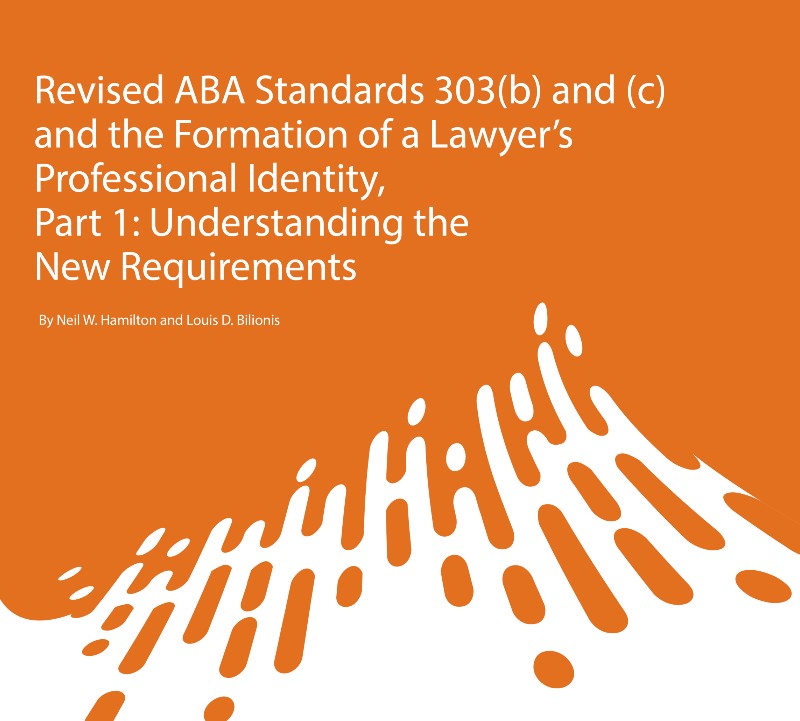By: Neil Hamilton, Holloran Professor of Law and Co-Director of the Holloran Center for Ethical Leadership in the Professions, University of St. Thomas School of Law
Accreditation Standard 303(b) asks legal educators, including faculty and staff, to engage students in “an intentional exploration of the values, guiding principles, and well-being practices considered foundational to successful legal practice.” Some legal educators may be asking whether the profession has core values and guiding principles and whether the new standard requires imposing these values and principles on our students. This essay focuses first on what are the core values and guiding principles of the legal profession? The essay then turns to a second question of how most effectively to engage students in an intentional exploration of the core values and guiding principles.
What are the legal profession’s core values and guiding principles?
In my experience, many legal educators have not done an in-depth exploration leading to a clear definition of the core values and guiding principles of our profession. They are in fact living into a set of professional values and guiding principles, but it may be challenging to write them down. The values and principles may seem inchoate initially when written down. This exploration was not part of our law school experience.
Reflecting on my own law school experience many years ago, I remember that the major core value modeled in every course was that I should strive to become a craftsperson of the law, demonstrating the highest level of all the technical skills of being a lawyer, as my professors both modeled and asked me to demonstrate. I don’t remember any discussion or guided reflection on this or other core values.
I think many legal educators today, especially in experiential education, engage students on core professional values and principles, but my experience is that few law schools as a community of practice together have reflected on, discussed, and agreed upon the core values and guiding principles of that school’s community of practice. Standard 303(b) is inviting the faculty and staff of each law school to engage collegially in intentional exploration of that community of practice’s understanding and definition of the core values and guiding principles of the profession.
As a starting place for this collegial intentional exploration of the core values and guiding principles of the profession, the Holloran Center has synthesized a succinct definition from the Preamble to the Model Rules of Professional Conduct, the four major reports on professionalism from the ABA and the Conference of Chief Justices, and Holloran Center research.[1] There are two foundational core values that law students and lawyers must understand, internalize, and demonstrate:
- a deep responsibility and commitment to serving clients, the profession, and the rule of law;
- a commitment to pro-active continuous professional development toward excellence at all the competencies needed to serve others well in the profession’s work.
These are the same foundational core values for all of the peer-review professions, such as medicine, nursing, and engineering.[2]
For a longer definition of the profession’s core values and guiding principles, Holloran Center borrowed directly from the Preamble to the Model Rules of Professional Conduct, adopted by all 50 states.
Law students and lawyers should understand, internalize, and demonstrate:
- a deep responsibility and service orientation to others, especially the client, whom the student serves in widening circles as the student matures including a commitment to:
-
- zealously protecting and pursuing a client’s interests within the bounds of the law while demonstrating respect for the legal system and a courteous and civil attitude toward all persons involved in the legal system;
- improving the law, providing pro bono service to the disadvantaged, developing cultural competence, and promoting a justice system that provides equal access and eliminates bias, discrimination, and racism in the law;[i]
- developing and being guided by personal conscience—including the exercise of “sensitive professional and moral judgment” and the conduct of an “ethical person”—when deciding all the “difficult issues of professional discretion” that arise in the practice of law; and
- developing independent professional judgment, including moral and ethical considerations, to help the client think through decisions that affect others;
- pro-active continuous professional development toward excellence at all the competencies needed to serve others in the profession’s work well; and
- compliance with the minimum standards of competency and ethical conduct in the Rules of Professional Conduct.
How do we most effectively engage students in an intentional exploration of these core values and guiding principles?
New Interpretation 303-5 emphasizes two of the most important curricular principles to engage students in an intentional exploration of these core values and guiding principles.
- Each student should have frequent opportunities for reflection on these core values and principles in courses and co-curricular and professional development activities; and
- Each student’s growth toward later stages of development regarding these core values and guiding principles will occur over time.
My earlier blog post on the Standard 303 revisions emphasized that the new standards require law schools to move toward a coordinated progression of guided reflection modules in the curriculum to foster each student’s growth in exploring these core values and principles.
Law Student Professional Development and Formation: Bridging Law School, Student, and Employer Goals (2022) outlines eight additional curricular principles that will foster each student’s exploration of these core values and principles.
The core values and principles discussed in this document come directly from the legal profession’s own rules of conduct, studies conducted of lawyers, and extensive research regarding the values and principles exhibited in the legal profession. It is important to understand that professional identity formation does not involve legal educators “instilling” or “inculcating” these core values and principles into students. Rather, professional identity formation entails explicitly and intentionally identifying and sharing these values and principles with law students. Each student then engages in an exploration of and guided reflection upon the core values and guiding principles of the profession that lead to successful legal practice. It is a life-long exploration for each lawyer.
If you have any questions or comments about this post, then please contact me at NWHAMILTON@stthomas.edu.

Neil Hamilton is the Holloran Professor of Law and Co-Director of the Holloran Center for Ethical Leadership in the Professions at the University of St. Thomas School of Law in Minnesota.
[1] See William Sullivan et al, EDUCATING LAWYERS: PREPARATION FOR THE PROFESSION OF LAW 128-40 (2007); Neil Hamilton, Professionalism Clearly Defined, 18 THE PROF. LAWYER 4-20 (No. 4, 2008); Neil Hamilton, Assessing Professionalism: Measuring Progress in the Formation of an Ethical Professional Identity, 5 U. ST. THOMAS L.J. 470,482-83 (2008); Neil Hamilton, Fostering Professional Formation (Professionalism): Lessons From Carnegie Foundation’s Five Studies on Educating Professionals, 45 CREIGHTON L.R. 763-97 (2012).
[2] See Neil Hamilton, The Core Values of the Service Professions and an Effective Curriculum to Help Students Internalize Them, in EDUCATING ETHICS ACROSS THE PROFESSIONS: A COMPENDIUM OF RESEARCH, THEORY, PRACTICE, AND AN AGENDA FOR THE FUTURE (R. Jacobs ed., 2022).
[3] Note that new interpretation 303-6 provides that the core values and responsibilities of the profession should include the importance of cross-cultural competence and the obligation of lawyers to promote a justice system that provides equal access and eliminates bias, discrimination, and racism in the law.



